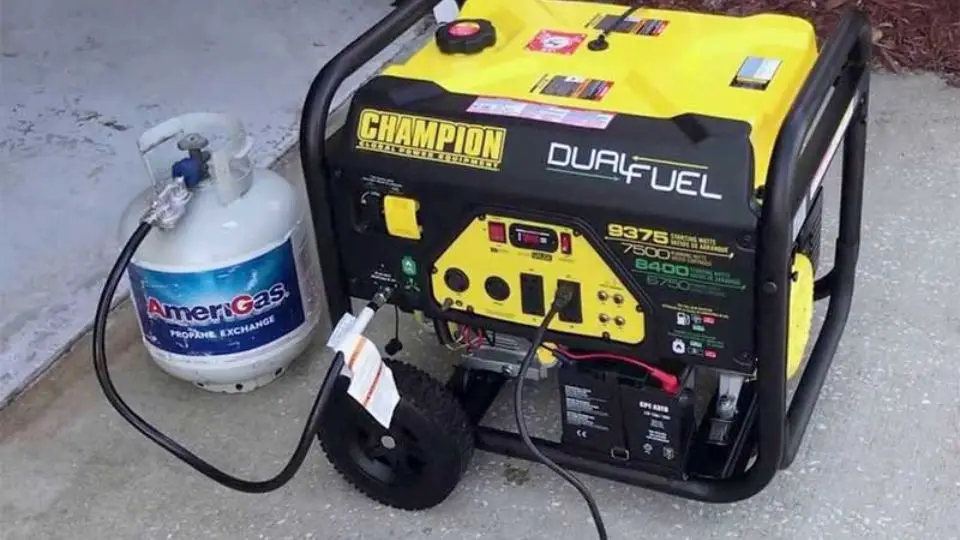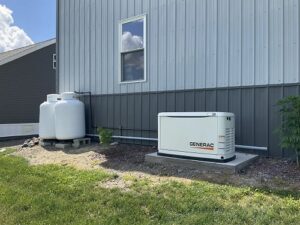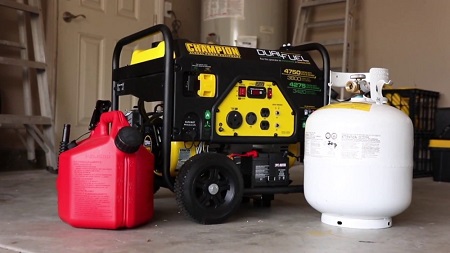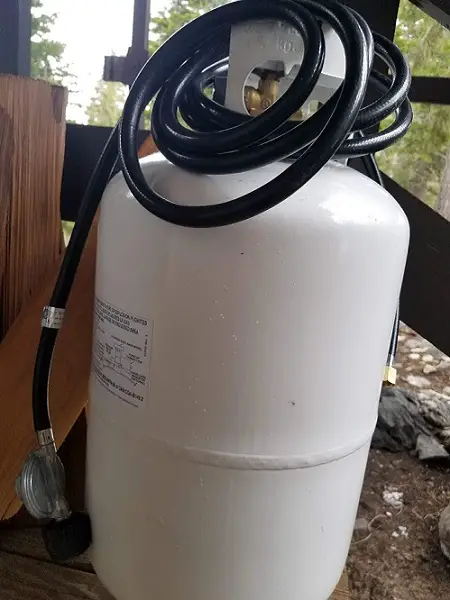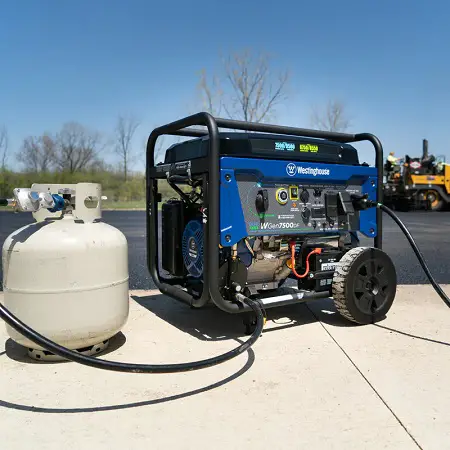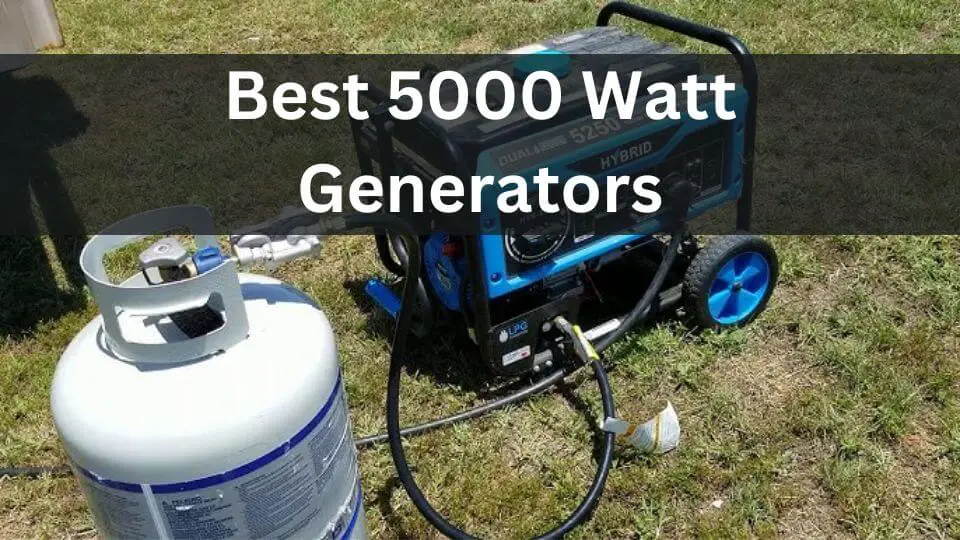This post may contain affiliate links. As an affiliate, we earn from qualifying purchases. We get commissions for purchases made through links in this post.
Propane-powered or dual-fuel generators are an excellent source of backup power, especially if you have this fuel readily available. However, one question that often arises is how much propane does a generator use? The answer to this question depends on various factors, including the size of the generator, the total load of its consumers, a specific generator model, and whether is getting regular maintenance.
A 20-pound propane tank, which holds approximately 4.6 gallons of propane, can run an average of up to 10 hours. However, this may vary depending on the size of the generator and the load. In general, larger generators will consume more propane than smaller ones, and a generator powering a heavy load will use more propane than one running only at 25%.
To estimate how much propane you need to store, you can use a simple calculation. First, determine how much propane your generator uses per hour, then multiply this by the number of hours you plan to use it and add a bit for contingency. This will give you an estimate of the total propane you need to keep in storage. However, it’s important to note that this is just an approximation, and the actual propane consumption may vary depending on a set of factors.
Understanding Propane Generators
Propane generators are a popular choice for backup power during emergencies or power outages. They are reliable, consistent, and easy to use. In this section, we will discuss how propane generators work, how much propane they use, and the benefits of using propane as a fuel source.
How Propane Generators Work
Propane generators work by burning propane to power an internal combustion engine, which drives an alternator to produce electricity. Propane is stored in a tank and supplied to the engine via a fuel line. The combustion of propane with air creates mechanical energy, converted into electrical energy by the alternator. A regulator controls the propane flow, ensuring a steady and safe supply to the engine.
No products found.
How Much Propane Does a Generator Use
The amount of propane a generator uses depends on its size and how long it is used. On average, a propane-powered generator can consume about two to three pounds of propane hourly. However, this can vary depending on the generator’s size, age, and usage.
To calculate how much propane your generator is using per hour on average, run it continuously on a single propane tank of a known size. Keep note of the load you put on a generator (25%, 50%, 100%) to obtain a correct result. Make sure to use the entire tank of propane and then divide its volume by the number of hours you were able to run your generator. This will provide you with propane usage per hour at a given load.
NOTE: If you don’t have a generator that can run on propane yet, or if you don’t want to perform the manual calculation, there will be other methods of calculation provided below, so keep reading.
Benefits of Using Propane as a Fuel Source
There are many benefits to using propane as a fuel source for generators. Propane is a clean-burning fuel that produces fewer emissions than gasoline.
Propane is also safer to store than gasoline, as it does not pose the same fire and explosion risks. Propane tanks can be safely stored outside, and they do not have the same shelf-life limitations as gasoline.
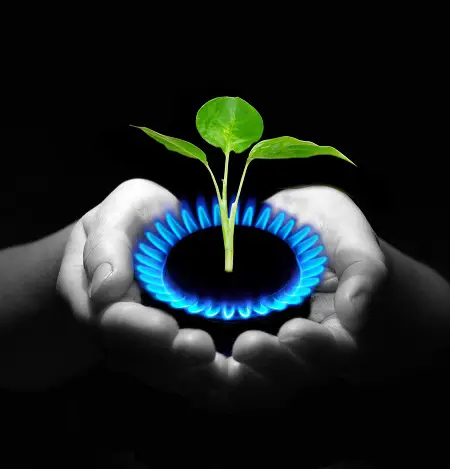
Finally, propane generators can also be converted to run on natural gas. This is useful for situations where propane or gasoline may not be readily available in contrast to natural gas pipelines, or if the generator needs to be run for an extended period of time.
Overall, propane generators are a reliable and efficient source of backup power. They use propane as a fuel source, which is clean-burning, has enough energy density, and is convenient to store. By understanding how propane generators work and how much propane they use, individuals can make informed decisions about which generator is right for their needs.
Average Propane Consumption of Generators
When it comes to generators, propane is a popular fuel choice for many homeowners. But how much propane does a generator use? The answer depends on several factors, including the size of the generator, the load it is powering, and how long it is running.
Portable Generators
Portable generators are typically smaller and less powerful than standby generators. They are designed to be moved around and used in different locations. Portable generators can run on propane, gasoline, or (much more rarely) diesel fuel, but propane is often preferred because it burns cleaner and produces fewer emissions.
On average, a portable generator powered by propane can consume about 2 to 3 pounds of propane per hour. This means that a 20-pound propane tank could power a portable generator for around 6-10 hours, depending on the load it is powering.
No products found.
Standby Generators
Standby generators are larger and more powerful than portable generators. They are designed to be permanently installed outside of a home or business and are connected directly to a propane tank or natural gas line. Standby generators are typically used as backup power sources during power outages.
The propane consumption of a standby generator can vary widely depending on its size and the load it is powering. A 100-pound propane tank can run a 7-kilowatt generator for 66 hours, or a 12-kilowatt generator for 36 hours. A 500-gallon propane tank could power a 22-kilowatt generator for around 30 hours at full load.
It’s important to note that standby generators are designed to be used for extended periods of time, so they are typically more fuel-efficient than portable generators. They are also designed to automatically start up and shut down when needed, so they can provide uninterrupted power during an outage.
In conclusion, the amount of propane a generator uses depends on its size, load, and runtime. Portable generators typically consume 2-3 pounds of propane per hour, while standby generators can consume much more. Homeowners should consider their power needs and choose a generator that is appropriately sized for their home or business.
How Much Propane Does a Generator Use Per Hour?
Propane generators are a popular choice for backup power, especially in areas where power outages are common. One of the most important factors to consider when using a propane generator is how much propane it uses per hour.
On average, generators use between 2 to 3 lbs of propane. Sometimes more, depending on the load it can be up to 4.2 pounds at 100% load. Some modern inverter generator models, like Champion Power Equipment 200988, will consume less than 1 lb of propane at 25% load. Another example is the Westinghouse 6600 Watt Dual Fuel Home Backup Portable Generator that will use around 2.2 lbs of propane per hour at 25% load.
How to Calculate Generator Propane Usage per Hour?
To calculate how much propane a generator uses per hour, one can use a simple formula. According to learnmetrics.com, the formula is:
Generator Propane Usage = Propane Generator Size × Rated Load × Running Hours / (26.80 kWh/Gallon × Propane Efficiency)
Where you would need to always use 1 for Running hours. So, for example, let’s calculate propane usage for a 6,000 Watt (6kw) generator with a Propane Efficiency of 0.223 and 100% Rated Load):
6kW × 1.00 × 1h / (26.80 kWh/Gallon × 0.223) = ~ 1 Gallon Per Hour
The above result converted to pounds would be somewhere around 4.2. In the calculation above, 1.0 stands for a full load. You can substitute reduced loads of 0.75, 0.5, etc, and will get a smaller consumption. Just be sure to also replace the Propane Efficiency with a corresponding value instead of 0.223. Some of the most frequently used values corresponding to Rated Load (taken from learnmetrics.com):
- 0.223 propane efficiency at 100% rated load (1.0).
- 0.21 propane efficiency at 75% rated load (0.75).
- 0.186 propane efficiency at 50% rated load (0.5).
- 0.198 propane efficiency at 25% rated load (0.25).
It is important to note that the above formula is just an estimate, and the actual propane consumption rate may vary depending on several factors, including the age and condition of the generator, the altitude, and the load being powered.
In summary, the amount of propane a generator uses per hour depends on several factors, including the generator’s size, the load it is powering, and its age and condition. By using the above formula, one can estimate how much propane a generator will consume per hour and plan accordingly. It is also worth consulting your generator’s manual for factory-measured propane usage, so you can avoid doing the calculations.
Effects of Altitude and Temperature on Propane Consumption
Propane generators are a reliable source of backup power during emergencies or power outages. However, their fuel consumption varies depending on several factors, including altitude and temperature.
At high altitudes, the air is thinner, which affects the propane-to-air ratio in the generator’s combustion chamber. As a result, the generator may consume more propane to produce the same amount of power as it would at sea level.
Temperature also affects propane consumption in generators. High temperatures reduce the density of the air, which affects the propane-to-air ratio in the combustion chamber. As a result, the generator may consume more propane to produce the same amount of power as it would at lower temperatures. According to Genesal Energy, generator engines may start to derate at temperatures above 40°C.
Do not neglect the effect of increased propane usage on higher altitudes, especially if you are traveling to mountains in your RV and want to run a generator from a propane tank. Take a bigger tank or add 1 grab one extra, just in case.
Cost Analysis of Using Propane Generators
Propane generators are a popular choice for backup power during power outages. However, it is important to consider the cost of using propane as a fuel source for generators. Here are some factors to consider:
Propane Cost: The cost of propane varies depending on the region, supplier, and time of year. As of 2023, the average cost of propane is around $2.30 per gallon in the United States. This cost can add up quickly, especially if the generator is used frequently or for long periods.
Propane vs Gasoline Cost: Gasoline costs more than propane, but, keep in mind, it has a higher energy density so it will provide more power for the same amount of fuel. However, gas tends to degrade over time (3 to 6 months), while propane can be stored indefinitely in a tank.
Generator Efficiency: The efficiency of the generator plays a significant role in determining the cost of using propane. The higher the efficiency, the less propane the generator will use, and the lower the cost. It is essential to choose a generator with a high-efficiency rating to minimize fuel consumption and reduce costs.
Generator Size: The size of the generator also affects the cost of using propane. Larger generators consume more propane, which increases the overall cost. It is important to choose a generator that is appropriately sized for the power needs to avoid overconsumption of propane.
Propane Tank Size: The size of the propane tank used to fuel the generator also affects the cost. Larger tanks can hold more propane, which can reduce the frequency of refilling. However, larger tanks are also more expensive to purchase and install.
Maintenance and Repair Costs: Like all machines, generators require maintenance and repairs to remain in good working order. The cost of maintenance and repairs can add up over time and should be factored into the overall cost of using a propane generator. In general, however, engines that are being run on propane require less frequent maintenance.
Overall, propane generators can be an effective and reliable source of backup power, but it is important to consider the cost of using propane as a fuel source. By choosing an efficient generator, appropriately sized for power needs, and using the right size propane tank, the cost of using a propane generator can be minimized.
Do Propane Generators Run Longer?
Propane generators are a popular choice for backup power during power outages. One of the main advantages of propane generators is their ability to run longer than gasoline generators.
Propane has a lower energy density than gasoline, which means that it will produce less energy per unit of fuel. This means that the same amount of propane will run your generator for less period of time when compared to gas. However, propane tanks are usually quite big, which means you will be able to run the same generator longer on propane than gas.
The amount of time a propane generator can run on a single tank of fuel depends on several factors, including the generator’s size, the load it is powering, and the size of the propane tank. On average, a propane generator can consume about two to three pounds of propane hourly.
The size of the propane tank also affects how long a propane generator can run. A 100-pound propane tank can run a 7-kilowatt generator for 66 hours, or a 12-kilowatt generator for 36 hours. A 500-gallon propane tank can run a generator for even longer periods.
Efficiency Tips for Propane Generators
Propane generators are a reliable and efficient source of power during emergencies or when camping. To ensure that your propane generator runs efficiently and lasts longer, follow these tips:
- Regular Maintenance: Regular maintenance is essential to keep your propane generator running efficiently. Change the oil and air filter regularly, inspect the spark plug, and ensure that the fuel lines are clean and free from any blockages.
- Proper Storage: Proper storage is crucial to ensure that your propane generator lasts longer. Store your generator in a dry and cool place, and cover it with a protective case to prevent dust and debris from accumulating.
- Proper Usage: Proper usage is essential to ensure that your propane generator runs efficiently and safely. Avoid overloading the generator beyond its rated capacity, and ensure that the propane tank is properly connected and secured.
- Use a Propane Fuel Gauge: A propane fuel gauge can help you monitor the propane level in the tank and prevent the generator from running out of fuel. It is also important to ensure that the propane tank is properly filled and that the tank valve is fully open.
- Run the Generator at Optimal Load: Running the generator at optimal load can help improve its efficiency. It is recommended to run the generator at 50% of its maximum rated capacity.
By following these tips, you can ensure that your propane generator runs efficiently and lasts longer. It is also important to read the manufacturer’s manual and follow their recommendations for maintenance and usage.
How much propane does a generator use in 24 hours?
Calculating how much propane a generator uses in 24 hours is essential to ensure that you have enough fuel to keep it running. The amount of propane a generator uses depends on several factors, such as its size, power output, and the load it is carrying.
The most reliable way to calculate the propane usage for 24 hours is to multiply the consumption per hour (according to the previous sections of this article) by 24. For example, in one of my previous examples, the Westinghouse generator that’s using 2.2 lbs of propane per hour at 25% load would consume 2.2 x 24 = 52.8 pounds of propane if running with the same rated load.
It is always wise to add a contingency to the calculation to account for any emergencies or unforeseen circumstances. A good rule of thumb is to add an extra 20% to the total propane needed. Therefore, for a 24-hour period of fuel consumption for the previous example, the propane required would be around 63.36 lbs.
It is also important to consider the size of the propane tank required to store the necessary amount of propane. A 20 lbs propane tank would usually be enough to run a generator for 9 to 20 hours, depending on the generator model, and load. A 100 lb tank would allow running a generator for 45 to 100 hours, depending on the generator model and rated load.
In summary, the amount of propane a generator uses in 24 hours depends on its size, power output, and the load it is carrying. To calculate the amount of propane required, multiply the propane used per hour by the number of hours, and add a contingency of around 20%. It is also important to consider the size of the propane tank required to store the necessary amount of propane.
How Long Will a 7500 Watt Generator Run on Propane?
A 7500 Watt generator is a powerful machine that can provide enough power to run the essential appliances and electronics in a home during a power outage. However, its runtime on propane depends on a few factors, such as the size of the propane tank and the load on the generator.
Depending on the specific generator and propane tank you will use, the run time will vary. For example, one of the most popular dual-fuel generators Champion Power Equipment 100891 (7500 running Watts) will run 5.5 hours at 50% load on a single 20 lbs propane tank. Other generators of the same size will run more or less hours depending on their efficiency and the load you put on them.
No products found.
If the generator is not running at full capacity, it will consume less propane and therefore run for a longer time. For example, if the above generator is running at half capacity, it will consume about 3.6 lbs of propane per hour, which means that a 100 lbs propane tank will grant you almost 30 hours of run time at 50% load.
It’s important to note that the actual runtime of a 7500-watt generator on propane can vary depending on other factors, such as the age and condition of the generator, the altitude and temperature of the location, and the quality of the propane. Therefore, it’s always a good idea to have extra propane on hand in case of unexpected power outages or other emergencies.
How long will a generator run on a 20lb tank of propane?
Propane is a popular fuel source for generators because it is efficient, reliable, and readily available. Many people wonder how long a generator will run on a 20lb tank of propane. The answer is that most propane generators will run for at least 5 hours on a 20lb tank. However, several variables can affect the run time, such as the size of the generator and the load placed on it.
Home-style generators typically use between two and three pounds of propane per hour. Therefore, a 20lb tank of propane will last between 6 and 10 hours, depending on the generator’s size and load. It is essential to note that running a generator at full capacity will use more propane than running it at half capacity.
It is always a good idea to have extra propane tanks on hand in case of an emergency. If you are occasionally using a portable generator as a backup power source during a power outage, it is recommended to have at least two 20-lb tanks of propane available, or, even better a single 100 lbs tank. This will ensure that you have enough fuel to keep your generator running for an extended period.
In conclusion, a 20lb tank of propane will typically last between 6 and 10 hours, depending on the generator’s size and load. It is essential to have extra propane tanks on hand in case of an emergency to ensure that you have enough fuel to keep your generator running for an extended period.
Conclusion
Overall, the amount of propane a generator uses depends on various factors, including the generator’s fuel efficiency, power output, and duration of operation. Basic calculations can be done to determine the volume of propane required to run a dual-fuel generator.
It is worth noting that propane generators produce over 12% less carbon dioxide and 20% less nitrous oxide than their natural gas counterparts, which results in an 80% reduction in smog produced due to using generators. This makes propane generators an eco-friendly option for those who prioritize sustainability.
Most generators will use between 25-75% of their capacity when running on propane to make the fuel supply last longer. Portable propane cylinders range in size from 20 to 100 lbs, while bigger stationary tanks can be installed at homes or businesses. It is important to note that propane tanks should be stored and handled with care to avoid accidents or leaks.
Overall, propane generators are a reliable and efficient source of backup power during emergencies. By understanding how much propane a generator uses, users can plan accordingly and ensure they have enough fuel to last through extended power outages.

